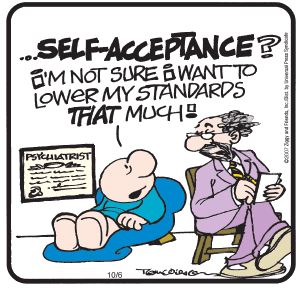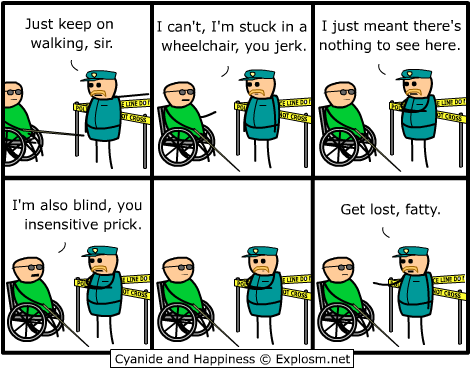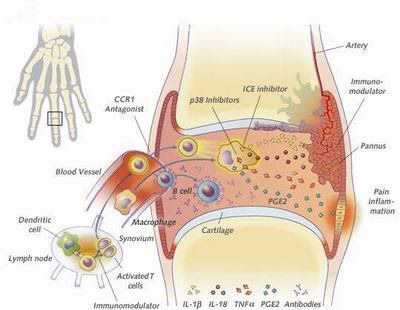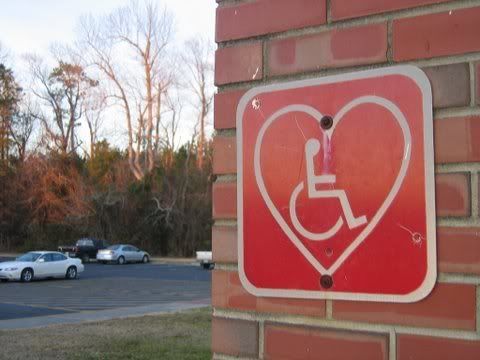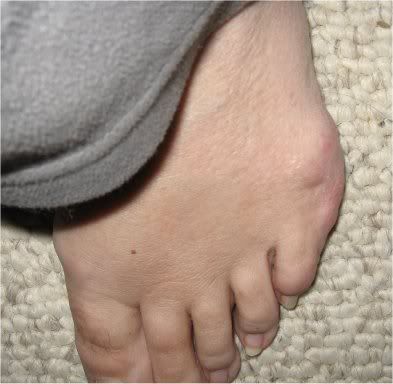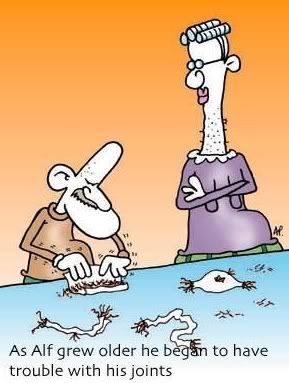Do you remember when you were little, and you climbed up in Granny’s lap? "Be careful, darling," she’d say. "Gently, snookums," she’d whisper, as you’d hug her. She would often warn you to use care and be gentle, as her ’Rheumatism was acting up a bit’. We smiled and climbed up anyway. And Granny let us. Why? Because she wanted our love! We didn’t understand what it meant to have arthritis as kids. And we certainly never expected it to affect us, in our perfect little lives, not until we were old like Granny anyway. And Granny’s hands looked gnarly.
Bulging and deformed knuckles are a classic sign of arthritis.
But,
not all of us grow up to have those perfect little lives that jive with
our perfect little time lines. Often times, we hide our reality, lest
our peers, our coworkers, even our family, judge us for ’breaking down’
earlier than they do. ’Invisible Illnesses’ that will rob years from our
future, make every day more difficult, and cost untold dollars in
treatments. We don’t want to appear weak, or unworthy of our social
class places in our community. But the fact is, we are here with you. We
are mixed in with you, the perfect. And we are your mothers, your
sisters, your bosses, and your children. We are your neighbors, your
friends, and your grocery clerks. You just don’t know it. We hide it
well. And you fear us, because you could BE us, one day. We don’t want
to be shunned, or worse, pitied. We want understanding. Acceptance.
Appreciation for what we are capable of.
We live in a time when we are expected to excel. Do the right thing,
work hard, and you will reap the rewards. That’s what we are taught from
the day we start Kindergarten. We work, pay our
taxes, raise our own kids, we love our animals and we hope we make a
difference in the world. Our country brags about being at the top of
everything (even when we know better) and that seems to be part of the
fallacy that causes so much conflict. The reality is, we hide our
weaknesses as a nation, hoping others won’t see them. We do it
politically, militarily and most sadly, domestically. There is positive
strategy in boosting our egos in politic and military realms, but the
fact that we turn our backs on the truth of our frailty in our own
backyard is shameful.
For the purpose of this blog, I want to focus on physical illnesses that
most people can’t see by just looking at the patient. (No, I’m not
shunning mental illness, but that’s a completely different blog topic.)
Yes, there are the short-term injuries we all endure in life, but I’m
talking more than just a self-inflicted ’bum knee’. I’m talking about
systemic illness, the kind that affects your every breathing moment,
your daily quality of life, and your ability to live pain free.
Illnesses like Multiple Sclerosis, Fibromyalgia, Diabetes, Muscular
Dystrophy, Crohn’s Disease, Immune System disorders, Heart disease, and
other, life-altering diseases. Things we cannot cure, but fight every
day to survive. Those illnesses you pray you don’t ever get. Yeah. Those
ones.
There are many illnesses that are invisible. I personally can relate to
Rheumatoid arthritis, as that is my diagnosis, and has been for over 20
years now. I also have Sjogrens Syndrome, which causes dryness of all
mucus membranes (eyes, mouth, etc). I don’t look
like it, but on the inside, my body is pretty darned sick. RA is an
autoimmune disorder that affects my entire body.
It’s like my own body is attacking itself, a vast sea of mini-pacmen
destroying my healthy joints. In order to control it, I have to try to
kill my immune system with chemotherapy, which that has it’s own set of
symptoms and difficulties.
It’s a constant balancing act, and if you were unaware of my struggles,
you may not notice the thinning hair, the utter exhaustion or the lack
of appetite. If it unbalances on the flip side of the arthritis, I am
prone to cancers. It’s a treatment plan that often feels as though it’s
as bad as the illness itself. You might see my swollen joints, but you’d
have to look to notice. And I’d have to allow you to see them. I hide
it well.
Fingers spread out as wide as possible. The thumb is severely restricted.
Making a fist. See how hard it is to use my hands?
Most
of the people who have had contact with me in the last year cannot tell
you what my symptoms are, as I have learned to work around them in
order to function. I am expected to function, ya know? When people meet
me, I avoid a handshake as it is painful. People can’t understand why I
don’t have a totally full schedule. I look so damned healthy! There was a
time in my life when I was the super woman – houseful of kids, 2-3 jobs
at a time, and lots of activities. I’ve had to slow down a little, but
I’m finding that isn’t a totally bad thing, per se. Well, I could have a full dance card, if I really wanted to - One
day a week. But arthritis is a sneaky little bugger – you cannot
predict it. One day, I may be able to hike a forest path for 5 miles,
but I most certainly will pay a price for it the next day. Or week. I
won’t know until I try. So I don’t make plans ahead. I can’t. But I do
try.
I am often judged unfairly when I am in public. One of the most common
biases raises it’s head when I drive to the grocery store. I have a
little blue dangly for my car’s rear view mirror - a disabled parking
pass - which I do not abuse on days when I feel fairly good and strong. I
use it only when I really need to. Yes, I am the girl who parks in the
slot with the little blue wheelchair signs. I get out, but I appear
healthy as I climb from the car. I am the one you rant at. And I see
your sneers. I hear your rude comments. I know what you are thinking - I
remember the days when I was perfect too. But you have no idea how much
of a difference my little blue placard changes my life. If you compare
my gait as I return to the car, you will see a different girl. That
little spiel around the store has made my foot arch dislocate with each
step.
That bulge by my baby toe is my bones jutting outward.
Yes, it hurts with each step.
Yes, it hurts with each step.
If it’s a big store, my feet can almost go numb from such intense pain.
But because of saving a few steps, I will have enough energy to spend
an evening with my son, watching a movie with my feet up. I can stand in
the kitchen and cook a meal for us. By parking closer, and using a
grocery cart as a walker, I have a better life with my son. (You think I
really need the cart to just grab a loaf of bread and a gallon of milk?
I bet you had no idea of that little trick either, right?) To be a
better mom - THAT is what is important to me. That is why I tolerate
your glares and remarks.
Next time you think about judging someone parking
in a handicapped spot, think about the fact that they may have one of
these invisible illnesses.
One common trait is severe fatigue.
Most of the illnesses that are invisible have one major symptom in
common - fatigue. There is usually chronic pain involved and pain is
extremely draining. I personally do not take any pain medications,
however I am getting to the point where I need to consider it. I use
humor as my drug of choice for the most part, as those of you who know
me can guess. I live to laugh. When the laughter doesn’t seem to dampen
it to at least a five on a 1 to 10 scale, it’s time to get help. When
the laughter ends, I suspect I will too. Until then, keep those happy
blogs coming!
Special thanks to Ang for requesting this blog.


